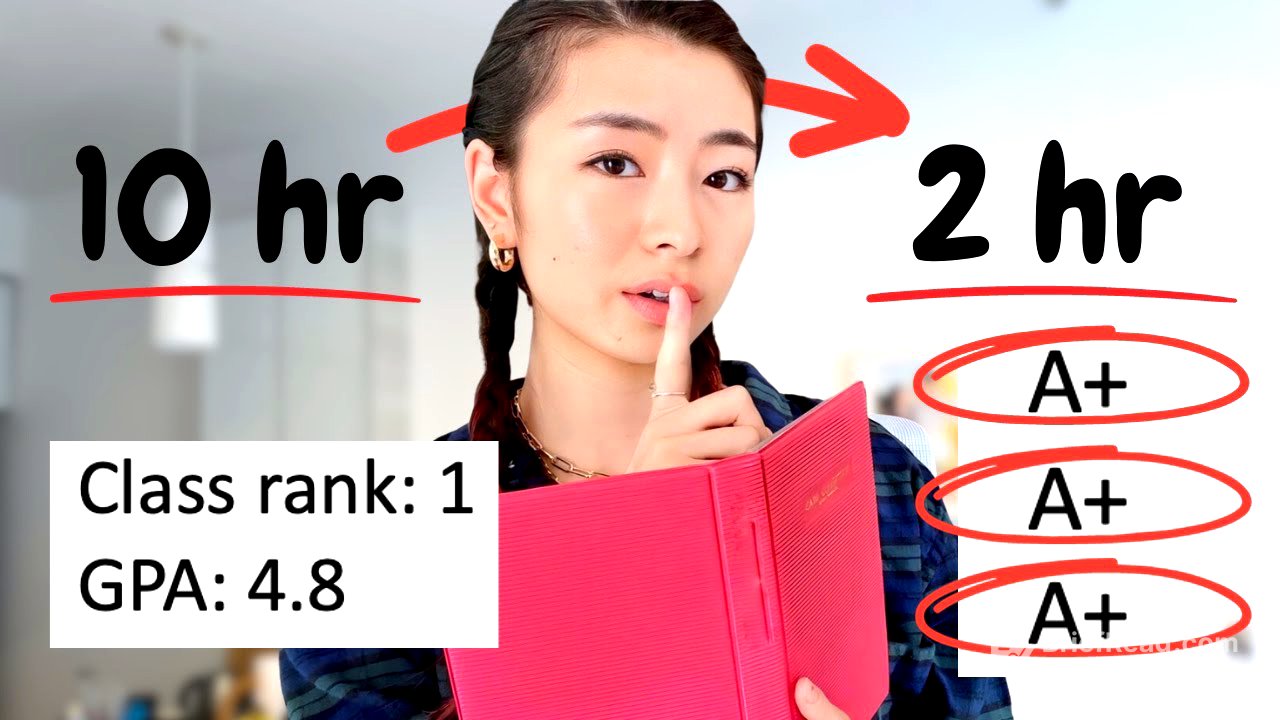TLDR;
Amy Wang shares her top tips for studying efficiently, drawing from her experience as a valedictorian and varsity athlete. She emphasises the importance of maximising productivity with minimal wasted effort, regardless of academic goals. The core strategies include gaining awareness of assignments early, learning by doing rather than passively studying, using parallel recall to actively engage with the material, having an accountability partner, pivoting when stuck, and reducing screen time to improve focus.
- Gain awareness of assignments early
- Learn by doing instead of passive studying
- Use parallel recall to actively engage with material
- Have an accountability partner
- Pivot when stuck
- Reduce screen time to improve focus
Level up your studying like never before [0:00]
The video introduces the concept of efficient studying as a way to reduce study time and improve overall life balance. Amy Wang shares her experience as a valedictorian with the highest GPA in her district's history, all while participating in varsity sports, getting enough sleep, and maintaining a social life, despite having migraines. She defines efficiency as achieving maximum productivity with minimum wasted effort, which is crucial for managing the demands of school and personal life.
You'll get the best tips from a valedictorian + varsity athlete [0:49]
Amy Wang addresses viewers' requests for effective study tips, sharing the strategies she used in high school and college. She explains that she has spent three weeks considering which tips would be most helpful to present in a single video. The last tip, she claims, will automatically put viewers ahead of their classmates.
Tip 1 [1:16]
The first tip is to "gain awareness ASAP" by looking at homework assignments as soon as they are assigned. This involves glancing at all the questions and ensuring you have the necessary resources to solve them. This allows you to ask your teacher questions early and identify easier problems to tackle first, creating a sense of achievement. Gaining awareness helps you estimate how long assignments will take, reducing stress and improving time management.
Tip 2 [2:24]
The second tip is to "learn by doing," which means jumping straight into homework instead of studying beforehand. The homework will guide you to what you need to know, and tests typically focus on homework-style questions anyway. When you encounter a problem you don't know how to solve, refer to the textbook or notes and alternate between the homework and the resources. This combines studying and doing work, saving time and helping you filter out unnecessary information. This method also enhances memory and understanding by creating deeper neural connections through active engagement.
Tip 3 [4:02]
The third tip involves "parallel recall," a form of active recall done while reading the textbook for the first time. Instead of passively reading, read a sentence or paragraph, then look up and repeat it in your own words, making connections with previous information. For example, after reading that "the mitochondria is the powerhouse of the cell," internalise the information and repeat it in your head, focusing on absorbing the meaning rather than memorising the words. This process keeps you engaged and helps you pay attention to what you're reading, ensuring you're not wasting time.
Tip 4 [6:04]
The fourth tip is to "have an accountability partner." Collaboration makes school and life easier, as you can learn from others and avoid starting from scratch. Set "soft deadlines" with your friend, which are deadlines a few days before the actual due date, and commit to studying, quizzing each other, or comparing homework answers together. You're more likely to meet these soft deadlines because you don't want to let your friend down. Working with a friend also enhances learning through teaching and explaining concepts, and it provides a chance to socialise while doing homework.
Tip 5 [7:54]
The fifth tip is to "pivot when you're stuck." When you're struggling with a problem, try for a few minutes, then immediately ask a friend for help. There's no shame in asking for help; it's better to be "dumb" to your friends and teacher than on the actual test. While waiting for your friend to respond, work on something else to prevent frustration. If your friend doesn't know either, bring the problem to your teacher. Changing direction and working on a different problem allows you to mull it over subconsciously, and the change of scenery can spark new ideas.
Tip 6: The procrastination killer [10:00]
The sixth tip, described as a "procrastination killer," is to reduce screen time. Recognising the difficulty of this, Amy shares her own struggles with social media and its impact on focus. She explains that scrolling trains your brain to forget previous information, which is detrimental to studying. To combat this, she deleted Instagram for five months before taking the GMAT, prioritising her GMAT score over sharing her life on social media. She encourages viewers to take action to control their social media habits, whether it's using app timers or deleting apps, to improve focus and academic performance.
How to execute and see amazing results [14:02]
Amy concludes by emphasising that following these tips helped her cut down her study time and make it more enjoyable. She advises viewers to try the tips one at a time and gradually incorporate them into their routine. She encourages viewers to try her tips before judging them. She ends with motivational words.









